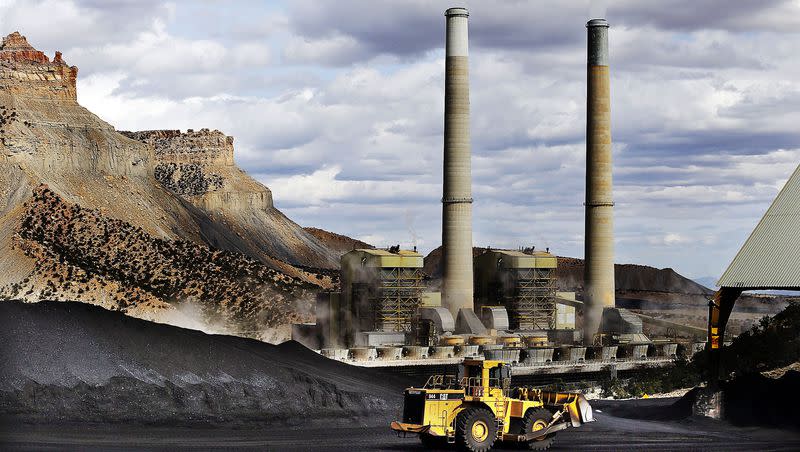Rural electric provider in Utah warns of ‘impending U.S. energy crisis’

A small, rural electric cooperative in eastern Utah approved a declaration of what it says is an “impending U.S. energy crisis,” fueled by the accelerated retirement of coal-fired power plants without ensuring an alternative base load energy supply can take their place.
In the action approved by board members of the Moon Lake Electric Association earlier this month, the nonprofit cooperative serving 24,121 connections that include the Ute Indian Tribe said current federal energy policies are untenable.
“There is a growing trend of decommissioning many of the existing dispatchable power generation resources across the country without viable replacements. Demand for energy continues to increase while the supply of reliable and affordable electricity follows a downward trajectory leaving the nation’s populace with an electricity deficiency,” the cooperative said in a letter.
“As the electricity deficiency progresses, it will result in higher cost of electricity to the ‘Average Joe’ domestically. In other words, those with greater financial means will be able to afford electricity while the less fortunate will have to go without — this crisis cannot be tolerated,” it said.
Yankton Johnson, chief executive officer and general manager of the Moon Lake Electric Association, said there were blackouts in nine states last December due to lack of capacity amid a grid experiencing vulnerabilities.
He said that is what drove them to issue the declaration, adding that the net zero and carbon free emissions goals set by the Biden administration are too much, too soon.
“It’s unrealistic and it’s too ambitious. They need to pull back on the throttle, pump the brake and think about what they’re going to do to individuals,” he said.
The fight over coal
The state of Utah earlier this month launched a legal fight over the U.S. Environmental Protection Agency’s ozone rule, which it asserts is another regulation designed to snuff out coal-fired power plants.
Related
Johnson said rural electric generation is especially at risk because it falls on the whims of a market that is geared to how much the actual energy costs and who can pay the going price when demand is high.
“Even if we generate power in our service territory with the Bonanza coal fired plant, if the power goes off in California, my power that is generated here at 460 megawatts does not stay in my area,” he said. “It goes to the energy imbalance market and they divvy it up,” based on supply, demand and cost.
“I tell my members that power flows toward money,” Johnson said.
Related
The letter and accompanying declaration implores action by elected leaders in Colorado and Utah and was distributed to members of Utah’s congressional delegation, Gov. Spencer Cox and local eastern Utah representatives, among others.
Their concern cited the “premature closure” of coal-fired power plants in Craig and Hayden, Colorado, as well as the switch Intermountain Power Plant in Delta plans to make from coal to natural gas.
“One might question the reasoning behind these governmental actions. Moon Lake fully supports the ‘all-of-the-above’ approach to fuel sources that include: hydroelectric power, clean coal, natural gas, solar, wind, geothermal, nuclear, and other proven fuel stocks,” it said.
While the association supports renewables, Johnson said the technology is not there at this point to move wind and solar from its intermittent status to a 24-hour supply.
“The best example I give to our members is with dispatchable power and you can obviously call on that on demand. And when you flip the light switch on when you wake up in the morning, 98% of the time in our service territory, the power is there,” he said. “Now if we replace that with solar and wind, that reduces that 98% down to just under 30%. The wind doesn’t always blow and the sun isn’t always out, so you’re not always generating what we refer to as capacity.”
Not just a rural problem
In its extensive planning document, PacifiCorp detailed in March the planned early retirement of two coal-fired power plants in Emery County and a significant ramp up of reliance on renewable energy. The utility company, in addition to pursuing an advanced nuclear power project in Kemmerer, Wyoming, said it has plans for that resource to replace Emery County’s power plants.
Related
The rural cooperative cited a national assessment by the North American Electric Reliability Corporation that pointed to the vast amount of vulnerabilities posing risk to the grid, including premature retirement of conventional generation, the substantial increase in energy demand, increases in widespread heat events and supply chain issues.
“Moon Lake beseeches all government officials to articulate, promulgate, and implement ‘common sense’ rationale to the U.S. energy policies thereby mitigating the foreseeable energy crisis and calamities that await,” the letter said. “As a rural community with numerous underserved communities, Moon Lake implores all governmental officials to take action now.”

